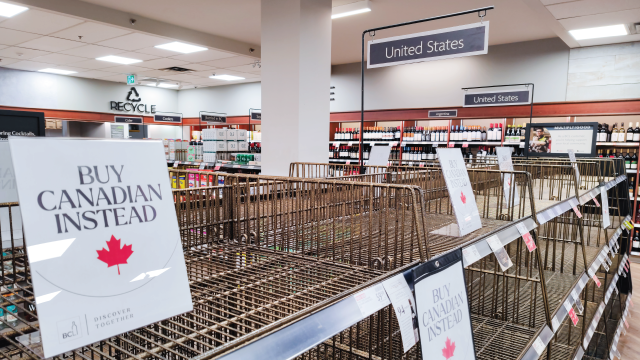
With Donald Trump back in office, Canadians’ opinions of the United States and its president are at or near historic lows, based on more than two decades of Pew Research Center polling.
Canadians express little confidence in Trump to do the right thing regarding world affairs or to handle several key global issues effectively. And a majority of Canadians now see the U.S. as the country that poses the top threat to their own – a marked shift from 2019, when China was most often named as the top threat.
At the same time, more than half of Canadians view the U.S. as the world’s top economy, and two-thirds say it’s more important for Canada to have close economic ties with the U.S. than with China.
These findings come from a survey of 1,024 Canadian adults conducted from Feb. 19 to April 15, 2025. The survey was being fielded as Canadian Prime Minister Mark Carney took office and after Trump announced initial tariffs against Canada, China and Mexico.
How Canadians view the U.S.
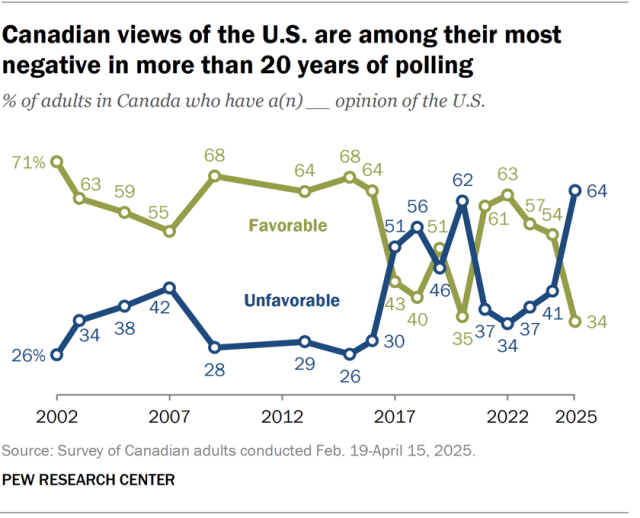
About a third of Canadians (34%) have a favorable opinion of the United States today. This is down 20 percentage points since last year.
Favorable views of the U.S. are now at their lowest point since we started asking this question in 2002, tied only with the 35% who had a favorable view of the U.S. in 2020, the final full year of Trump’s first term.
Nearly two-thirds of Canadians (64%) have an unfavorable opinion of the U.S., including 39% who have a very unfavorable view. This is the highest percentage of Canadians with a very unfavorable view of the U.S. in surveys dating back to 2002.
Views of the U.S. vary by ideology among Canadians. Those on the ideological left (17%) are less likely than those in the center (32%) or on the right (52%) to view the U.S. favorably. However, across all ideological groups, the share of Canadians with a favorable view of the U.S. has dropped by about 15 percentage points or more since last year.
How Canadians view Trump
Roughly a fifth of Canadians (22%) have confidence in Trump to do the right thing regarding world affairs. Last year, 52% had confidence in then-U.S. President Joe Biden.
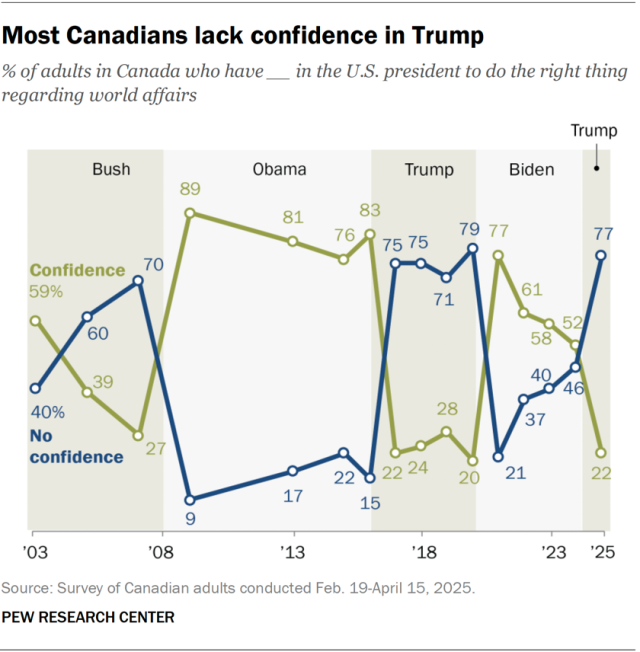
Confidence in the U.S. president is among the lowest it has been since we began asking this question in 2003. But it is on par with the low levels of confidence that Canadians had in Trump during much of his first term.
When asked about Trump’s personal characteristics, roughly nine-in-ten Canadians (91%) describe him as arrogant, compared with 14% who said the same about Biden during his first year in office.
About three-fourths of Canadians (76%) say Trump is dangerous, up from 15% who said this about Biden in 2021. Canadians are also less likely to describe Trump as a strong leader than they were to say this about Biden (40% vs. 63%).
When it comes to his handling of various global issues, most Canadians lack confidence in Trump. For example, 74% do not express confidence in Trump to handle global economic problems, including 57% saying they have no confidence at all in him on this issue. Trump has repeatedly threatened Canada with tariffs since the beginning of his second administration. Canada sells about three-fourths of its goods to the U.S.
How Canadians view the U.S.-Canada relationship
In two open-ended questions, we also asked Canadians to name their country’s most important ally and its greatest threat. A 55% majority of Canadians name the U.S. as their country’s top ally. The UK is the second-most common response at 17%.
But a 59% majority of Canadians also name the U.S. as their country’s top threat. Most Canadians who say this perceive the U.S. as a great deal of a threat to their country’s economy (77%), and 53% say it is a great deal of a threat to their national security. On multiple occasions since winning the election for his second term, Trump has called for Canada to become “the 51st state.”
After the U.S., China is the second-most common country that Canadians see as a threat, named by 17% of respondents. This marks a major shift from 2019, when we asked a slightly different but comparable question. At that time 32% of Canadians named China as the top threat, followed by the U.S. at 20%.
Related: People in Many Countries Consider the U.S. an Important Ally; Others See It as a Top Threat
Which country do Canadians see as the world’s top economy?
While most Canadians express negative views about the U.S. and its president, a growing share also view their southern neighbor as the world’s leading economic power.
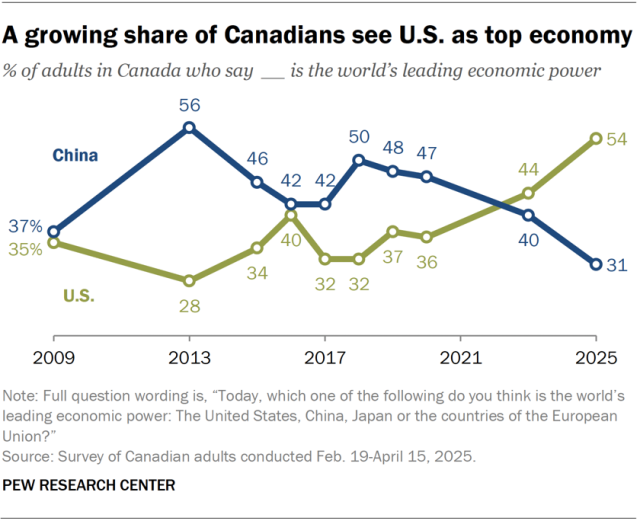
More than half of Canadians (54%) say the U.S. is the world’s leading economy. This is the highest figure recorded since the Center started asking the question in 2009, and the first time that significantly more Canadians say the U.S. than China (which 31% of Canadians view as the top economy).
Since we last asked this question in 2023, the share of Canadians who say the U.S. is the world’s top economy has grown by 10 percentage points. In fact, Canada is the only country of 23 surveyed where more people view the U.S. as the world’s leading economic power today than two years ago.
Related: Views of the U.S. have worsened while opinions of China have improved in many surveyed countries
In Canada, this change in perception has been driven primarily by people on the ideological right. Around six-in-ten Canadians on the right (62%) now see the U.S. as the leading economic power, up from 44% in 2023. Views have not changed significantly among Canadians in the ideological center or on the ideological left.
How Canadians view economic ties between the U.S. and China
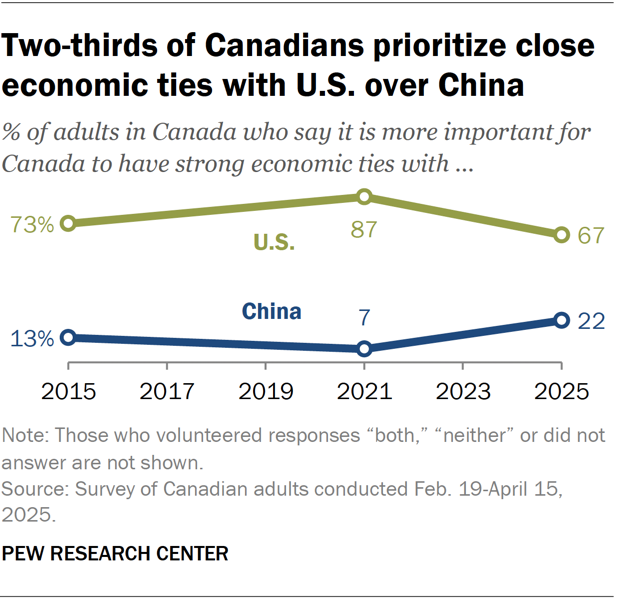
When asked whether it is more important for Canada to have strong economic ties with the U.S. or China, two-thirds of Canadians prefer close ties with the U.S. But this reflects a 20-point drop since 2021, the first year of the Biden administration, when 87% of Canadians preferred strong economic ties with their southern neighbor.
Canadians across ideological groups were broadly in agreement in 2021. But today there are large ideological differences. In particular, Canada’s ideological left is less likely than the center and the right to prefer closer economic ties with the U.S. Around six-in-ten Canadians on the ideological left (58%) prefer to have strong economic ties with the U.S., compared with 67% of those in the center and 76% of those on the right.


